School 4 ranks in the bottom 50% of all schools in New York for overall test scores (math proficiency is bottom 50%, and reading proficiency is bottom 50%).
The percentage of students achieving proficiency in math is 25-29% (which is lower than the New York state average of 46%). The percentage of students achieving proficiency in reading/language arts is 25-29% (which is lower than the New York state average of 49%).
Quick Stats (2025)
- Grades: Prekindergarten-5
- Overall Testing Rank: Bottom 50% in NY
- Math Proficiency: 25-29% (Btm 50%)
- Reading Proficiency: 25-29% (Btm 50%)
- Science Proficiency: 70-79% (Btm 50%)
- Source: National Center for Education Statistics (NCES), NY Dept. of Education
School Overview
Grades Offered
Grades Prekindergarten-5
(offers virtual instruction)
(offers virtual instruction)
Total Students (20-21)
236 students
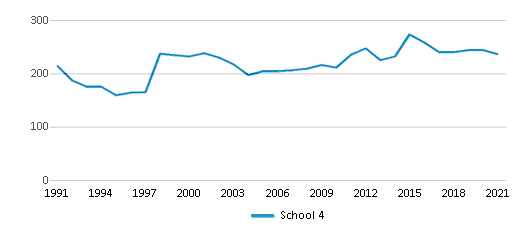
Total Classroom Teachers (20-21)
19 teachers
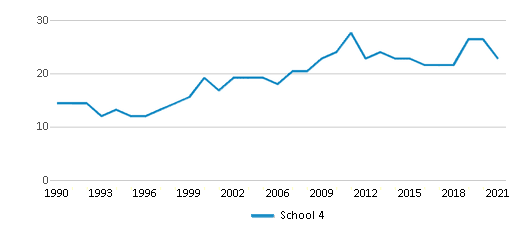
School Rankings
School 4 ranks within the bottom 50% of all 4,377 schools in New York (based off of combined math and reading proficiency testing data).
Overall Testing Rank
#3562 out of 4377 schools
(Bottom 50%)
(Bottom 50%)
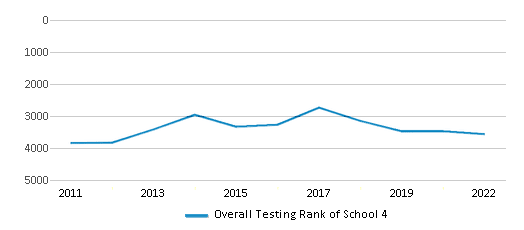
Math Test Scores (% Proficient)
25-29%
46%
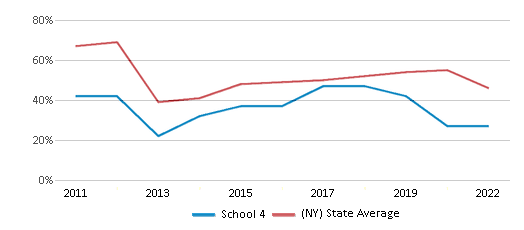
Reading/Language Arts Test Scores (% Proficient)
25-29%
49%
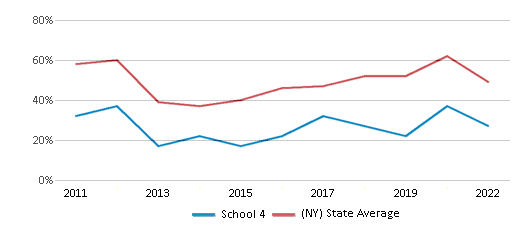
Science Test Scores (% Proficient)
70-79%
78%
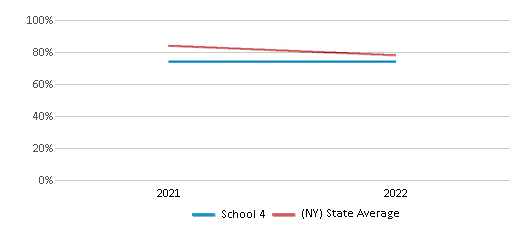
Student : Teacher Ratio
n/a
11:1
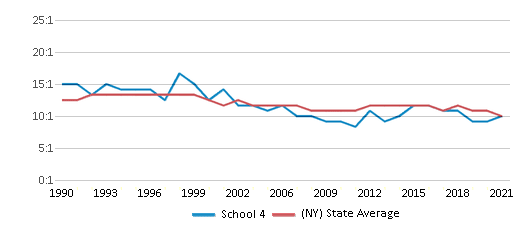
American Indian
(20-21)1%
1%
Asian
(20-21)1%
10%
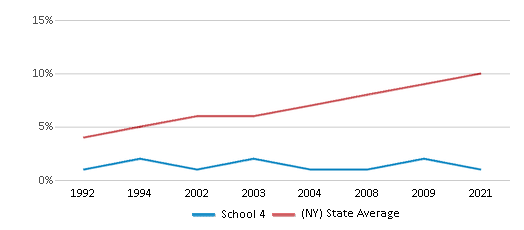
Hispanic
(20-21)50%
28%
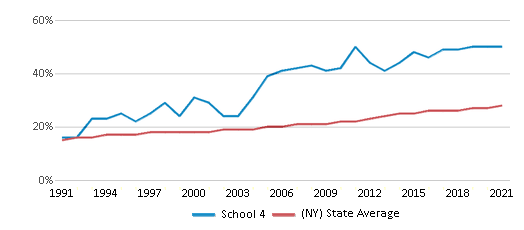
Black
(20-21)3%
17%
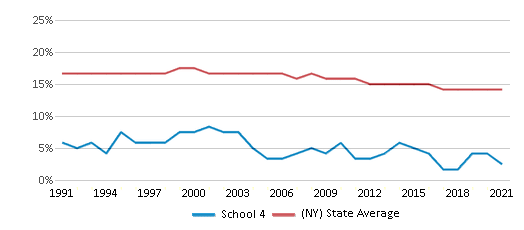
White
(20-21)42%
41%
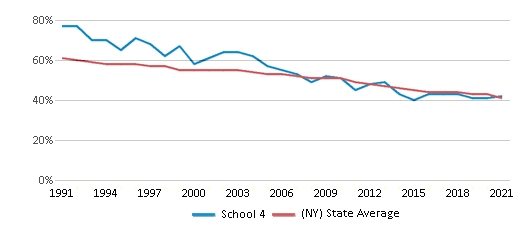
Hawaiian
(20-21)n/a
n/a
Two or more races
(20-21)3%
3%
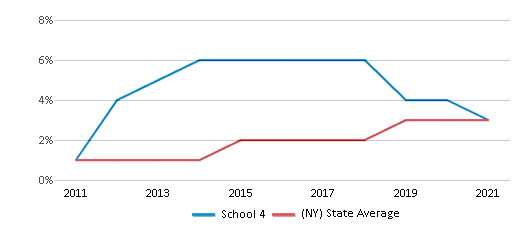
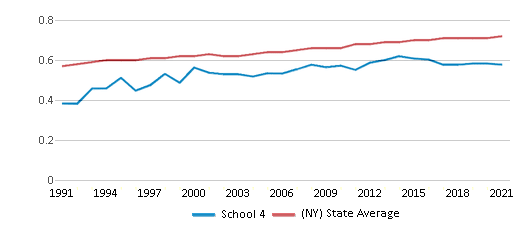
Participates in the National School Lunch Program (NSLP)
Yes
Eligible for Free Lunch (20-21)
67%
52%
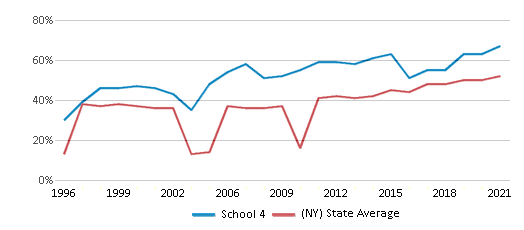
Eligible for Reduced Lunch (15-16)
1%
5%
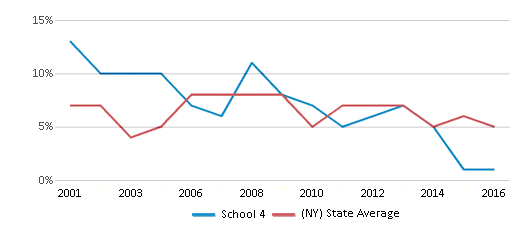
School Statewide Testing
School District Name
Source: National Center for Education Statistics (NCES), NY Dept. of Education
Profile last updated: 02/09/2025
Frequently Asked Questions
What is School 4's ranking?
School 4 is ranked #3562 out of 4,377 schools, which ranks it among the bottom 50% of public schools in New York.
What percent of students have achieved state testing proficiency in math and reading?
25-29% of students have achieved math proficiency (compared to the 46% NY state average), while 25-29% of students have achieved reading proficiency (compared to the 49% NY state average).
How many students attend School 4?
236 students attend School 4.
What is the racial composition of the student body?
50% of School 4 students are Hispanic, 42% of students are White, 3% of students are Black, 3% of students are Two or more races, 1% of students are American Indian, and 1% of students are Asian.
What grades does School 4 offer ?
School 4 offers enrollment in grades Prekindergarten-5 (offers virtual instruction).
What school district is School 4 part of?
School 4 is part of Dunkirk City School District.
School Reviews
Review School 4. Reviews should be a few sentences in length. Please include any comments on:
- Quality of academic programs, teachers, and facilities
- Availability of music, art, sports and other extracurricular activities
Recent Articles

What Is A Charter School?
Explore the world of charter schools in this comprehensive guide. Learn about their history, how they operate, and the pros and cons of this educational innovation. Discover key facts about charter schools, including admission policies, demographics, and funding, as well as what to look for when considering a charter school for your child.

10 Reasons Why High School Sports Benefit Students
Discover the 10 compelling reasons why high school sports are beneficial for students. This comprehensive article explores how athletics enhance academic performance, foster personal growth, and develop crucial life skills. From improved fitness and time management to leadership development and community representation, learn why participating in high school sports can be a game-changer for students' overall success and well-being.

February 05, 2025
Understanding the U.S. Department of Education: Structure, Impact, and EvolutionWe explore how the Department of Education shapes American education, from its cabinet-level leadership to its impact on millions of students, written for general audiences seeking clarity on this vital institution.





